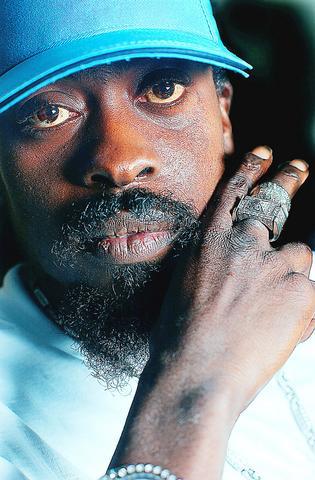When the reggae star Beenie Man came to the Hammerstein Ball-room on Friday, he received his usual welcome. There was a frenetic introduction. There was an exuberant crowd of thousands, waving whatever he told them to wave: hands, flags, cell phones. And out front there were about a dozen pickets, hoisting signs and chanting: "No more murder music! No more murder music!"
Over the past month, Beenie Man has found himself at the center of a growing controversy over anti-gay lyrics in dancehall reggae, the rapid-fire genre descended from reggae. Beenie Man, one of the genre's most popular performers, is known for his witty, lascivious boasts and for collaborations with mainstream stars like Janet Jackson and the Neptunes.

PHOTO: AP
But his oeuvre also includes a fistful of tracks that denounce gay men (known pejoratively as "chi-chi men" or as "batty boys," after a slang term for buttocks) and women.
And now the British gay-rights organization Outrage, prompted by a Jamaican group called J-Flag (the Jamaican Forum for Lesbians, All-sexuals and Gays), has begun a campaign against anti-gay lyrics in dancehall reggae.
Beenie Man concerts have been canceled throughout Europe, Outrage is demanding that Scotland Yard investigate him for "inciting murder," and he was dropped from an MTV-sponsored performance in Miami. A contrite statement was put out by Virgin Records, Beenie Man's label, then swiftly disavowed by his manager. (Outrage has also singled out Buju Banton, Vybz Kartel, Ele-phant Man, T.OK, Bounty Killer, Capleton and Sizzla.)
Beenie Man has certainly drawn focus because of his popularity, but there's no denying that he has given Outrage a wide range of quotes from which to choose. In That's Right, the infectious chorus begins, "We burn chi-chi man and then we burn sodomite and everybody bawl out, say, `Dat right!'"
And in Han Up Deh, Beenie Man cracks some jokes ("Man a save yuh from drowning is a lifeguard/ Man a watch a man batty, him a batty-guard"), then delivers an anti-gay party chant, asking listeners to raise their hands if they agree: "Hang chi-chi gal wid a long piece a rope/ Mek me see di han' a go up, mek me see di han' a go up."
Virgin Records declined to make Beenie Man available for an interview, and a spokeswoman responded to queries with an official statement: "The lyrics in question are from songs released over four years ago, on an independent label not affiliated with Virgin Records. We do not condone violence."
But that's not accurate. It's true that these songs were released on independent labels (all reggae stars release underground singles alongside their official album releases), but "four years ago"?
The most charitable explanation is that executives at Virgin Records simply haven't been following the career of their own recording artist. Right now, Beenie Man has an underground hit with Weh Yuh No Fi Do, on which he announces "batty man fi dead," and Han Up Deh was an underground hit last year.
Lyrics like these are nothing new in dancehall reggae. A decade ago, Buju Banton drew protests for his song Boom Bye Bye, a blood-curdling song with a lurching beat and a murderous chorus: "Boom bye bye in a batty-boy head/ Rude boy no promote no nasty man, dem haffi dead."
Even as they portray themselves as swaggering "bad men," reggae stars also present themselves as forces for good: folk heroes, social activists, prophets. (Buju Banton, for example, sometimes calls himself "the voice of Jamaica.")
To be really successful, artists must do both at once, which is one reason vocalists find anti-gay rhetoric so useful. It gives them a way to gesture to religious and cultural injunctions against homosexuality (in interviews, the stars often cite Christian texts) while also reminding listeners of their "bad man" bona fides. With anti-gay lyrics, vocalists manage to seem simultaneously righteous and wicked.
A prominent reggae music executive, speaking anonymously for fear his comments might hurt the artists he works with, said that anti-gay lyrics were also strategic.
"It's not that the artists wake up and say gay people are taking over the country and we need to stamp them out," he said.
"They're doing it because they're saying: `I don't have a hit, what can I do that the public can't deny? Let me do another record, find another way to say, `Burn batty boy, stab batty boy,'" then music executive said.
He said DJs and listeners respond to songs like this because "they can't afford not to."
"People could say you didn't respond, you could be gay," he continued. "It's really childish."

The Venezuelan government on Monday said that it would close its embassies in Norway and Australia, and open new ones in Burkina Faso and Zimbabwe in a restructuring of its foreign service, after weeks of growing tensions with the US. The closures are part of the “strategic reassignation of resources,” Venezueland President Nicolas Maduro’s government said in a statement, adding that consular services to Venezuelans in Norway and Australia would be provided by diplomatic missions, with details to be shared in the coming days. The Norwegian Ministry of Foreign Affairs said that it had received notice of the embassy closure, but no

A missing fingertip offers a clue to Mako Nishimura’s criminal past as one of Japan’s few female yakuza, but after clawing her way out of the underworld, she now spends her days helping other retired gangsters reintegrate into society. The multibillion-dollar yakuza organized crime network has long ruled over Japan’s drug rings, illicit gambling dens and sex trade. In the past few years, the empire has started to crumble as members have dwindled and laws targeting mafia are tightened. An intensifying police crackdown has shrunk yakuza forces nationwide, with their numbers dipping below 20,000 last year for the first time since records

EXTRADITION FEARS: The legislative changes come five years after a treaty was suspended in response to the territory’s crackdown on democracy advocates Exiled Hong Kong dissidents said they fear UK government plans to restart some extraditions with the territory could put them in greater danger, adding that Hong Kong authorities would use any pretext to pursue them. An amendment to UK extradition laws was passed on Tuesday. It came more than five years after the UK and several other countries suspended extradition treaties with Hong Kong in response to a government crackdown on the democracy movement and its imposition of a National Security Law. The British Home Office said that the suspension of the treaty made all extraditions with Hong Kong impossible “even if

CAUSE UNKNOWN: Weather and runway conditions were suitable for flight operations at the time of the accident, and no distress signal was sent, authorities said A cargo aircraft skidded off the runway into the sea at Hong Kong International Airport early yesterday, killing two ground crew in a patrol car, in one of the worst accidents in the airport’s 27-year history. The incident occurred at about 3:50am, when the plane is suspected to have lost control upon landing, veering off the runway and crashing through a fence, the Airport Authority Hong Kong said. The jet hit a security patrol car on the perimeter road outside the runway zone, which then fell into the water, it said in a statement. The four crew members on the plane, which